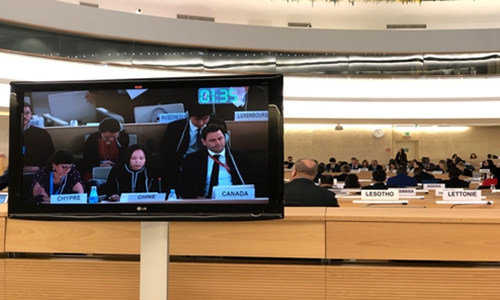HOME >> CHINA
Chinese diplomat calls for end of politicization of human rights topic
Source:Global Times Published: 2020/3/11 15:03:40 Last Updated: 2020/3/11 17:03:40

Photo: Liu Xin/GT
A few countries that vilified China with unwarranted accusations regarding Xinjiang Uygur Autonomous Region and Hong Kong Special Administrative Region have their own human rights problems, and human rights are not a tool of political interference or a label employed to trumpet oneself as superior to others, a Chinese representative said at the 43rd session of the Human Rights Council on Tuesday in Geneva.In the few countries that vilify China, "racial discrimination and xenophobia have intensified, hate speech and violent crimes against immigrants have become increasingly severe, and violent law enforcement and large-scale monitoring have continued to emerge," Special Representative for Human Rights of the Ministry of Foreign Affairs of China Liu Hua said at the a general debate on country-specific human rights issues.
These countries are not genuinely helping developing countries achieve development or enjoy human rights but politicizing human rights and imposing so-called "Western-style democracy" on others in an attempt to interfere in and obstruct the development of other countries, according to Liu.
Liu Hua pointed out that on the issue of Xinjiang, there are two distinctly different voices internationally.
Some Western countries, despite the goodwill invitation of the Chinese side, refused to go to Xinjiang for various reasons, but kept producing rumors and slander, he said. However, more than 70 countries have explicitly supported China's policies regarding Xinjiang through letters and statements. They come from Asia, Africa, Europe and the Americas, and many are members of the Islamic Cooperation Organization.
"A majority of them visited Xinjiang in person and witnessed the truth. A just cause enjoys abundant support, while an unjust cause finds little support. The right and the wrong are crystal clear and straightforward," said Liu.
Liu noted that during this session, China has repeatedly emphasized that the series of counter-terrorism and deradicalization measures in Xinjiang adopted by the Chinese government, including the establishment of vocational education and training centers, have reversed the security situation in Xinjiang, safeguarded human rights of people of all ethnic groups and won universal support of the people there. All the trainees who have participated in deradicalization trainings have graduated.
China welcomes the High Commissioner for Human Rights to visit China, specifically Xinjiang, this year.
Regarding the situation in Hong Kong, Liu underlined that, since June last year, the demonstrations and protests in Hong Kong have gone far beyond the scope of freedom of assembly or freedom of demonstrations, and have evolved into complete illegal violence that seriously tramples on the rule of law and social order, seriously threatens the lives and property of Hong Kong citizens, and seriously contradicts the bottom line of the principle of one country, two systems.
Liu pointed out that the enjoyment of human rights for all is the common ideal of the mankind and the unremitting pursuit of the Chinese people. Human rights are not the patent of a few countries, let alone a tool of political interference or a label employed to trumpet oneself as superior to others.
Liu Hua highlighted that human rights protection is not limited to a Western style. Countries must follow paths that suit their own national conditions.
Posted in: IN-DEPTH